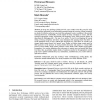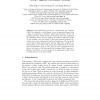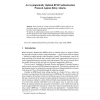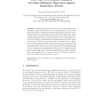319 search results - page 4 / 64 » Identification Protocols Secure against Reset Attacks |
101
Voted
IJACT
2008
15 years 13 days ago
2008
: In Group Key Exchange (GKE) protocols, users usually extract the group key using some auxiliary (ephemeral) secret information generated during the execution. Strong corruptions ...
99
Voted
EUROCRYPT
2000
Springer
15 years 4 months ago
2000
Springer
Password-based protocols for authenticated key exchange (AKE) are designed to work despite the use of passwords drawn from a space so small that an adversary might well enumerate, ...
110
Voted
CORR
2008
Springer
15 years 15 days ago
2008
Springer
Abstract. Relay attacks are a major concern for RFID systems: during an authentication process an adversary transparently relays messages between a verifier and a remote legitimate...
114
Voted
COMPSEC
2006
15 years 14 days ago
2006
Anonymity is a desirable security feature in addition to providing user identification and key agreement during a user's login process. Recently, Yang et al., proposed an eff...
EUROCRYPT
2007
Springer
15 years 6 months ago
2007
Springer
Abstract. Multiparty signature protocols need protection against roguekey attacks, made possible whenever an adversary can choose its public key(s) arbitrarily. For many schemes, p...




